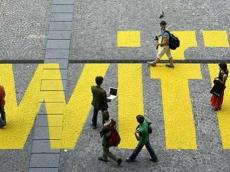|
|
TODAY.AZ / Society
How secure are public Wi-Fi access points?
05 June 2015 [11:43] - TODAY.AZ

By Nigar Orujova
As Baku is working to live up to its title of leading regional capital, it has turned to developing its tourism industry, looking to improve on its infrastructures and services to become tourist-friendly and appealing to all.
And since we live in a technology era, officials have been keen to improve on Azerbaijan's internet access. Those improvements have included of course global access to Wi-Fi internet. Baku residents and guests now enjoy free internet access across the capital: public places.
Of course, such dynamic growth in the IT sector has raised essential security issues.
Baku's Wi-Fi network now covers almost all public places in the capital. During the forthcoming 2015 European Games, free internet access will be offered to the public in all sports venues and adjacent areas.
The vast majority of access points will be deployed via three main mobile operators and Internet providers. Operators will provide free services to all for two months, after which, the service will be offered on a commercial basis.
While this news is likely to enchant Baku residents, questions surrounding security and privacy have arisen on the backdrop of such open free internet access.
Those countries that use free Wi-Fi access for a long time have already realized the threat posed by unprotected public Wi-Fi. An access to the network without authentication and registration opens endless opportunities for not only hackers but also terrorists.
Many countries are now considering or have already introduced certain restrictions on the free Wi-Fi access in public places such as airports, cafes, and parks.
Such security measures are relevant to Azerbaijan as well. The question is - how can the state create an effective mechanism which guarantees users' safety while online?
International practice suggests that free access points in airports for instance can be incorporated into plane tickets' boarding pass.
In other public places other methods of registration can be used. People should understand that these measures are taken in view of enhancing security and countering terrorism. Everyone should understand the threat posed by unprotected public internet access points in relation to personal data.
Hackers could effortlessly access users' private correspondence in social networks, e-mail and so on...
The situation in Europe is regulated as follow: many EU countries use the method of obligatory verification at all Wi-Fi points - to gain access users will need to register their details.
Some European countries use mobile numbers for verification before granting access to free Wi-Fi points. In Russia, there is a ban on all anonymous access to public Wi-Fi networks.
Azerbaijan has not yet determined what measure it will apply when it comes to free Wi-Fi. However, it can be said in advance that whatever method will be adopted in the near future, it will be done with people' safety in mind.
URL: http://www.today.az/news/society/141216.html
 Print version
Print version
Connect with us. Get latest news and updates.
See Also
- 07 November 2025 [13:39]
Azerbaijani Navy delegation visits Karachi for PIMEC-2025 - 07 November 2025 [13:25]
Azerbaijan taps foreign company to designing Baku Central Park - 07 November 2025 [12:02]
Conference in Baku focuses on proper use of Azerbaijani literary language in media - 07 November 2025 [10:43]
British Chamber of Commerce Azerbaijan hosts an event to launch its new logo - 07 November 2025 [10:21]
Madrid hosts “Sound of Peace” concert for Azerbaijan’s Victory Day Anniversary - 06 November 2025 [15:39]
Baku launches full-scale preparations for fifth Victory Day Parade - 06 November 2025 [11:03]
Kazakh grain train to Armenia passes through Azerbaijan - 05 November 2025 [11:45]
52 cyber threats detected and blocked in Azerbaijan - 05 November 2025 [10:20]
Prosecutor General’s Office holds conference in Zangilan marking fifth anniversary of victory - 04 November 2025 [10:50]
State Committee unveils five-year progress on Family and Child Legislation
Most Popular
 Armenia began to receive benefits from defeat in war - on eve of anniversary of Victory of Azerbaijan
Armenia began to receive benefits from defeat in war - on eve of anniversary of Victory of Azerbaijan
 Azerbaijan and NATO: The North Atlantic bloc has something to remember
Azerbaijan and NATO: The North Atlantic bloc has something to remember
 President Ilham Aliyev awards Baku Metro employees - decree
President Ilham Aliyev awards Baku Metro employees - decree
 President Ilham Aliyev receives NATO delegation
President Ilham Aliyev receives NATO delegation
 FC Qarabag to play next match in UEFA Champions League Group Stage
FC Qarabag to play next match in UEFA Champions League Group Stage
 Baku launches full-scale preparations for fifth Victory Day Parade
Baku launches full-scale preparations for fifth Victory Day Parade
 Leyla Aliyeva visits Bulbul Secondary Music School
Leyla Aliyeva visits Bulbul Secondary Music School
